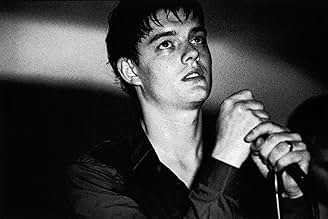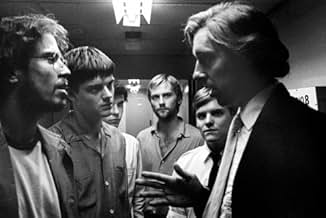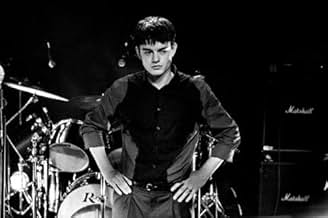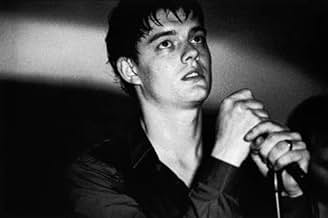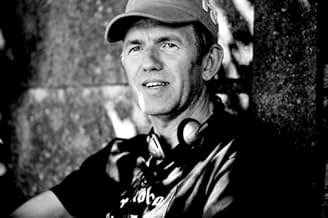CALIFICACIÓN DE IMDb
7.6/10
71 k
TU CALIFICACIÓN
Reseña de Ian Curtis, el enigmático cantante de Joy Division cuyos problemas personales, profesionales y románticos lo llevaron a suicidarse a los 23 años.Reseña de Ian Curtis, el enigmático cantante de Joy Division cuyos problemas personales, profesionales y románticos lo llevaron a suicidarse a los 23 años.Reseña de Ian Curtis, el enigmático cantante de Joy Division cuyos problemas personales, profesionales y románticos lo llevaron a suicidarse a los 23 años.
- Dirección
- Guionistas
- Elenco
- Ganó 1 premio BAFTA
- 31 premios ganados y 36 nominaciones en total
Martha Myers Lowe
- Ian's Sister
- (as Martha Myers-Lowe)
Mary Jo Randle
- Debbie's Mother
- (as Mary-Jo Randle)
- Dirección
- Guionistas
- Todo el elenco y el equipo
- Producción, taquilla y más en IMDbPro
Opiniones destacadas
For every icon, there is an unknown predecessor who paves the way. Before there was Kurt Cobain, there was Ian Curtis, lead singer of the post-punk band, Joy Division. 27 years after his tragic death, Curtis' incredible contribution to music is finally being recognized in Anton Corbijn's film, "Control." It's only fitting that Corbijn serve as director since it was his early photographs of Joy Division that reflected the band's dark, introspective songs. Corbijn went on to photograph and direct videos for such musical greats as U2, David Bowie, Depeche Mode, R.E.M. and Metallica.
With his first feature film, Corbijn avoids the pitfalls of many music video directors who inundate us with flashy and unnecessary edits and camera angles. Instead, he lets the stark black and white of the film tell the story of a lead singer tortured by epilepsy, guilt, depression and suicidal thoughts. The use of black and white also captures the factory town of Manchester, England in the late 1970s, a city crumbling under industrial and economic stress. Manchester has since rebounded and is once again thriving.
Curtis is played by relative newcomer, Sam Riley, who's quiet and unassuming approach portrays an artist inspired by his heroes, David Bowie and Iggy Pop. At a chance meeting following a Sex Pistols concert, Curtis bonds with three fellow musicians to form the band.
As Joy Division begins to flourish, Ian's relationship with his young wife, Deborah, continues to distance itself. Academy Award nominee, Samantha Morton plays the confused wife trying to understand her husband's depressed soul. The film is based on Deborah Curtis' autobiography, "Touching From A Distance", so it comes as a surprise that Morton's character does not have more scenes in the movie.
The key to Control is understanding Curtis' depression, which the film accomplishes to near perfection. As he battles epilepsy, the young singer lives in constant fear that his next seizure will be his last. His only option is to swallow a daily cocktail of prescription drugs with side effects so terrible, that most of us would rather tempt fate than endure the aftermath of the pills.
Ian's spirit is also tortured by overwhelming guilt brought on by an extra-marital affair with a part-time journalist, played by Romanian-born Alexandra Maria Lara.
The most telling scene comes when Ian records an in-studio track for the song "Isolation." While Curtis stoically sings into the microphone, his band mates are distracted with the normal banter that typically occurs in a studio.
"Mother, I tried, please believe me. I'm doing the best that I can. I'm ashamed of the things I've been put through. I'm ashamed of the person I am." The lyrics seem to fall on deaf ears except for those of the sound engineer who refers to it as "genius." But Ian's brilliance is also a desperate cry for help ignored by everyone in the studio.
The 27-year-old Riley does an excellent job of capturing Curtis' aloofness on stage. Singers such as Jim Morrison, Kurt Cobain and even the early years of Michael Stipe would often drift into the moment of the song. But when Curtis performed, he immersed himself into his own world where the music simply served as the soundtrack. Riley skillfully draws us into Ian's dark world with a range of subtle head movements and facial expressions to a whirling explosion of arm gyrations that came to personify the singer's stage performances.
Overwhelmed with grief, shame and depression, Ian finally succumbs to his demons at the young age of 23. He left behind a wife, a child and a musical legacy that is finally receiving its just rewards nearly three decades later.
For those looking for a story solely about Joy Division, Control may not be for you. But for those seeking an intuitive perspective into the anguished spirit of one of the most influential alternative bands in history, you will certainly find it in this depressing but incredibly beautiful film.
With his first feature film, Corbijn avoids the pitfalls of many music video directors who inundate us with flashy and unnecessary edits and camera angles. Instead, he lets the stark black and white of the film tell the story of a lead singer tortured by epilepsy, guilt, depression and suicidal thoughts. The use of black and white also captures the factory town of Manchester, England in the late 1970s, a city crumbling under industrial and economic stress. Manchester has since rebounded and is once again thriving.
Curtis is played by relative newcomer, Sam Riley, who's quiet and unassuming approach portrays an artist inspired by his heroes, David Bowie and Iggy Pop. At a chance meeting following a Sex Pistols concert, Curtis bonds with three fellow musicians to form the band.
As Joy Division begins to flourish, Ian's relationship with his young wife, Deborah, continues to distance itself. Academy Award nominee, Samantha Morton plays the confused wife trying to understand her husband's depressed soul. The film is based on Deborah Curtis' autobiography, "Touching From A Distance", so it comes as a surprise that Morton's character does not have more scenes in the movie.
The key to Control is understanding Curtis' depression, which the film accomplishes to near perfection. As he battles epilepsy, the young singer lives in constant fear that his next seizure will be his last. His only option is to swallow a daily cocktail of prescription drugs with side effects so terrible, that most of us would rather tempt fate than endure the aftermath of the pills.
Ian's spirit is also tortured by overwhelming guilt brought on by an extra-marital affair with a part-time journalist, played by Romanian-born Alexandra Maria Lara.
The most telling scene comes when Ian records an in-studio track for the song "Isolation." While Curtis stoically sings into the microphone, his band mates are distracted with the normal banter that typically occurs in a studio.
"Mother, I tried, please believe me. I'm doing the best that I can. I'm ashamed of the things I've been put through. I'm ashamed of the person I am." The lyrics seem to fall on deaf ears except for those of the sound engineer who refers to it as "genius." But Ian's brilliance is also a desperate cry for help ignored by everyone in the studio.
The 27-year-old Riley does an excellent job of capturing Curtis' aloofness on stage. Singers such as Jim Morrison, Kurt Cobain and even the early years of Michael Stipe would often drift into the moment of the song. But when Curtis performed, he immersed himself into his own world where the music simply served as the soundtrack. Riley skillfully draws us into Ian's dark world with a range of subtle head movements and facial expressions to a whirling explosion of arm gyrations that came to personify the singer's stage performances.
Overwhelmed with grief, shame and depression, Ian finally succumbs to his demons at the young age of 23. He left behind a wife, a child and a musical legacy that is finally receiving its just rewards nearly three decades later.
For those looking for a story solely about Joy Division, Control may not be for you. But for those seeking an intuitive perspective into the anguished spirit of one of the most influential alternative bands in history, you will certainly find it in this depressing but incredibly beautiful film.
Control, the story of Ian Curtis, singer of British alternative band Joy Division. The film is made in black and white, which adds a certain edge to the film. There isn't much drama or fast-paced scenes (until the very end, I guess), and that seems to be what everyone criticizes about the movie. Why do you think the director wanted it black and white? If it had been a sincerely boring film, why release it?
Of course they made up some aspects of Ian's life, but the fact is that Ian was a dull, depressed human being. He couldn't handle love, or fame overall. He doesn't show signs of emotion in the film, and doesn't speak much at all. Truth is, black and white was exactly what he saw, while he was spiraling towards the end of his life.
The acting is incredible. Absolutely spot on. Very very noteworthy.
I enjoyed Control, but that's only because I love indie films and rock and roll movies. If you're looking into this movie expecting some delicious drama and edge-of-your-seat thrills, just don't watch it. It's about a man who gradually fell apart, who gradually lost control. And if you can't see that in the film, it's definitely not worth watching.
Of course they made up some aspects of Ian's life, but the fact is that Ian was a dull, depressed human being. He couldn't handle love, or fame overall. He doesn't show signs of emotion in the film, and doesn't speak much at all. Truth is, black and white was exactly what he saw, while he was spiraling towards the end of his life.
The acting is incredible. Absolutely spot on. Very very noteworthy.
I enjoyed Control, but that's only because I love indie films and rock and roll movies. If you're looking into this movie expecting some delicious drama and edge-of-your-seat thrills, just don't watch it. It's about a man who gradually fell apart, who gradually lost control. And if you can't see that in the film, it's definitely not worth watching.
It's 1973 Macclesfield, England. Ian Curtis (Sam Riley) is a quiet enigmatic student. He marries Debbie Woodruff (Samantha Morton) in 1975. He works as an employment agent. On June 4, 1976, they attend a small Sex Pistols concert. Also in attendance are Bernard Sumner, Peter Hook, and Terry Mason. Ian joins them as their lead singer. They call themselves Warsaw and eventually Joy Division.
There is a sense of disconnection from this movie and a mystery about Ian Curtis. Sam Riley's performance, the long takes, and the black and white photography all make Ian an enigma. It's a slow burn but compelling. The tone is sad and respectful. It's very fitting of the band and its music.
There is a sense of disconnection from this movie and a mystery about Ian Curtis. Sam Riley's performance, the long takes, and the black and white photography all make Ian an enigma. It's a slow burn but compelling. The tone is sad and respectful. It's very fitting of the band and its music.
8tmk1
I saw this film last night then I went home and read a lot of the comments here. I think some things have been missed between the glowing reviews and the bitter disappointments.
First, it is a truly beautiful film and I found the acting uniformly excellent. That has already been said plenty of times.
More interesting to me are the comments about this not being an accurate or fair portrait of Ian Curtis and those around him. I've read plenty of accounts that characterize Ian and his band-mates as relentless practical jokers -- the book Torn Apart by Mick Middles and Lindsay Reade is full of these anecdotes. But I also think it's naive to expect a film like this to be anything close to a fair and objective telling of anyone's life. This is a dramatic interpretation, not a documentary.
In addition to the multiple meanings the title has for the characters in the film, this film is itself an exercise in CONTROL: Deborah Curtis's control over her husband's legacy; the surviving band members' control over the public image of Joy Division.
No, the film does not show the laughs and good times the band had, but this is in keeping with all of Joy Division's work. Their entire output as a living band was highly stylized. Almost everything they issued was in stark black and white; their imagery was overwhelmingly bleak and funereal; and they certainly courted controversy with their name and imagery. All of which was very consciously and tightly CONTROLLED by the band and the people at Factory. They gave few interviews and preferred to let the work speak for itself.
My point is that this film simply continues that project. It is yet another highly stylized piece of work in the Joy Division canon. To paraphrase the Tony Wilson remark that has been cited elsewhere in these comments -- when you have the choice between the legend and the facts, go with the legend. Their work has always had an epic, legendary quality. This movie is absolutely in keeping with that aesthetic.
I think it's also worth noting that Corbijn was a participant in shaping the Joy Division legacy from the very start -- his photographs of the band helped shape their image and his video for "Atmosphere" set the tone for how their legacy would be preserved. CONTROL is simply another collaboration with the band and their music. An extension of that original project.
I think that ultimately this film is an excellent piece of work. Just as Joy Division produced music of astonishing beauty and resonance out of the misery of life in post-industrial England, this film turns personal pain and loss into a powerful piece of art.
First, it is a truly beautiful film and I found the acting uniformly excellent. That has already been said plenty of times.
More interesting to me are the comments about this not being an accurate or fair portrait of Ian Curtis and those around him. I've read plenty of accounts that characterize Ian and his band-mates as relentless practical jokers -- the book Torn Apart by Mick Middles and Lindsay Reade is full of these anecdotes. But I also think it's naive to expect a film like this to be anything close to a fair and objective telling of anyone's life. This is a dramatic interpretation, not a documentary.
In addition to the multiple meanings the title has for the characters in the film, this film is itself an exercise in CONTROL: Deborah Curtis's control over her husband's legacy; the surviving band members' control over the public image of Joy Division.
No, the film does not show the laughs and good times the band had, but this is in keeping with all of Joy Division's work. Their entire output as a living band was highly stylized. Almost everything they issued was in stark black and white; their imagery was overwhelmingly bleak and funereal; and they certainly courted controversy with their name and imagery. All of which was very consciously and tightly CONTROLLED by the band and the people at Factory. They gave few interviews and preferred to let the work speak for itself.
My point is that this film simply continues that project. It is yet another highly stylized piece of work in the Joy Division canon. To paraphrase the Tony Wilson remark that has been cited elsewhere in these comments -- when you have the choice between the legend and the facts, go with the legend. Their work has always had an epic, legendary quality. This movie is absolutely in keeping with that aesthetic.
I think it's also worth noting that Corbijn was a participant in shaping the Joy Division legacy from the very start -- his photographs of the band helped shape their image and his video for "Atmosphere" set the tone for how their legacy would be preserved. CONTROL is simply another collaboration with the band and their music. An extension of that original project.
I think that ultimately this film is an excellent piece of work. Just as Joy Division produced music of astonishing beauty and resonance out of the misery of life in post-industrial England, this film turns personal pain and loss into a powerful piece of art.
Making the leap from photographer to music video director to film director, Anton Corbijn's feature length debut 'Control' is quite simply stunning. Shot entirely in black and white it tell the story of Ian Curtis the lead singer with Manchester band Joy Division but its also much more than that it also tells of one mans journey into the heart of darkness (Apocalypse Now is mentioned in the film) a journey of fear, paranoia, illness and depression. Curtis has been played in films before but only as bit parts (24 hour party people etc) here he is portrayed breathtakingly by Sam Riley who played Mark E Smith in 24 hour party people and when he first appears on the screen I have to admit I wasn't convinced but as Ian the person grows so too does Riley into the role and at times he has him so down to a tee its hard to imagine its not the real Curtis up there. The rest of the band are pretty good as well but are only really second fiddle to Riley but you have to give them credit for learning all the songs and playing them live rather than mime. Samantha Morton is great as the put upon wife Deborah and Craig Parkinson is convincing enough as Tony Wilson but apart from Riley's stand out performance its Toby Kebbell as manager Rob Gretton who has some of the best lines and has come so far since his role in 'Dead Man's Shoes'. The cinematography is a visual feast for the eyes, being shot in black and white adds to the mood and gives a haunting feel that echo's the music and lyrics of the band, it also means (and I guess its Corbijn's photography background) that so many of the shots in the movie could be still images they are framed so well. Although never really explained in terms of answers, Curtis's illness from the seizures to the depression and the hopeless sense of falling apart reminded me of Catherine Deneuve in Polanski's 'Repulsion' another black and white film that deals with madness. I guess that treating mental illnesses was still in its infancy in the seventies, yes we'd stopped electro-shocking people but medications were still being developed and trialled. It seems it was very easy for Curtis to reach a certain point what with juggling home, life on the road, his condition and the pressure of increasing fame but when it came to helping him out he really was on his own and did feel a sense of 'isolation'. But with a story that has a widely known end point its more about the journey and here Corbjin punctures the narrative with some truly witty moments while leading up the incredibly moving and inevitable finale. Handled brilliantly by all involved this is another example of a great British film that deserves all the accolades it is receiving and if this performance is anything to go by expect Riley to be very big indeed.
¿Sabías que…?
- TriviaThe actors playing Joy Division learned how to play the songs themselves. So the scenes where the band is playing live is not from tape, but actually the actors playing live.
- ErroresJoy Division is shown performing "Transmission" on Tony Wilson's television show in September 1978, but in reality, they performed "Shadowplay". The performance that is represented in this scene actually took place a year later in September 1979 on the BBC2 program "Something Else", when they performed "Transmission" (a performance which was used as the music video for the song) and "She's Lost Control".
- Citas
Ian Curtis: Existence. Well, what does it matter? I exist on the best terms I can. The past is now part of my future. The present is well out of hand.
- Créditos curiososSPOILER: Epilogue: "Ian Curtis died May 18, 1980. He was 23 years old."
- Bandas sonorasDrive-In Saturday
(David Bowie)
Published by kind permission of Tintoretto Music/RZO Music Ltd/EMI Music Publishing Ltd/Chrysalis Music Ltd © 1973
Performed by David Bowie
Courtesy of RZO Music
Selecciones populares
Inicia sesión para calificar y agrega a la lista de videos para obtener recomendaciones personalizadas
Detalles
- Fecha de lanzamiento
- Países de origen
- Sitio oficial
- Idioma
- También se conoce como
- Контроль
- Locaciones de filmación
- Productoras
- Ver más créditos de la compañía en IMDbPro
Taquilla
- Presupuesto
- EUR 4,500,000 (estimado)
- Total en EE. UU. y Canadá
- USD 872,252
- Fin de semana de estreno en EE. UU. y Canadá
- USD 27,674
- 14 oct 2007
- Total a nivel mundial
- USD 8,159,996
- Tiempo de ejecución
- 2h 2min(122 min)
- Color
- Mezcla de sonido
- Relación de aspecto
- 2.35 : 1
Contribuir a esta página
Sugiere una edición o agrega el contenido que falta





